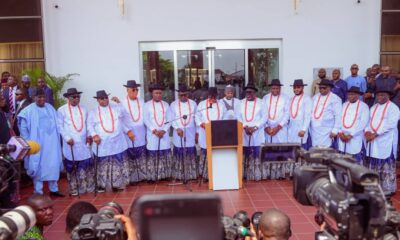Business
Recession: Reflect Rating On Prices Of Goods – Don
A university teacher, Dr Charles Nwaekeaku, has advised the Federal Government to ensure that the country’s exit from economic recession translates into lowering of prices of goods in the market.
Nwaekeaku, an Associate Professor of the Nasarawa State University, Keffi, gave the advice in an interview with newsmen last Wednesday in Abuja.
The National Bureau of Statistics (NBS) on Tuesday announced that Nigeria had exited from its economic recession.
The NBS announced this in its Gross Domestic Product (GPD) Report for the Second Quarter of the year released in Abuja.
It stated that the nation’s GDP grew by 0.55 per cent (year-on-year) in real terms in the quarter, indicating the emergence of the economy from recession.
The bureau stated that the figure indicated that the economy was out of recession after five consecutive quarters of contraction since first quarter 2016.
Nwaekeaku expressed delight that the country was officially out of recession and called on the government to ensure the exit impacted on the prices of goods in the market.
“As a Nigerian citizen, I am happy to hear that we have exited; it is a welcome development and shows that there is hope; it also signifies a major link out of the level of recession.
“But my prayer is that it should be translated into concrete terms which will be reflected on the quantity of food on the table of an average Nigerian which is still a far cry.
“The prices of everything in the market are still very high, so I do not know how we got the figures by the NBS, or could this be a conspiracy between some agencies of government to give us hope?’’
Nwaekeaku said that the inflation rate in the country was still very high and was more prevalent in the prices of food items.
He said the report noted an increase in about four sectors of the economy, including oil, agriculture, manufacturing and trade. According to him, “these increases are not marginal, they are not significant. But beyond that, my worry is that this statistics rolled out by the NBS are yet to be translated into concrete terms.
“It is believed that inflation has dropped a little but if you go to the market, a mudu of garri has gone up to N400 from about 250 in the last two weeks
“Although the news we have heard is heartwarming, an average Nigerian is yet to see the impact, the purchasing power of the naira has not changed”. The don commended the move by the NNPC to crash the prices of petroleum products such as fuel and cooking gas, saying it was a welcome development for the country.
He, however, said that the sustained oil price in the international market might have influenced the figures by the bureau.
Business
Expert Tasks Government On Civil Maritime Security Unit
Business
Bayelsa Recommits To Infrastructure, Sectoral Dev … Rakes In N227.185b From IGR
Business
NDYC Seeks NDDC Commercialisation … Uncompleted Projects Completion
-

 News1 day ago
News1 day agoFubara Attends PDPGF Meeting In Asaba …..Back Court Verdict On National Secretary Position
-
Nation1 day ago
Okehi Clan Demands Recognition, Upgrade Of Chieftaincy Stool
-
Business1 day ago
REA, RESCOs Sign Agreement To Establish 23 Mini-grids
-
News1 day ago
Telecom Operators Dismiss Talks With NLC On Tariff Hike
-
Politics1 day ago
How Akande Lied Against Me Over Bola Ige’s Case – Ladoja
-
Rivers1 day ago
Police Confirm Vehicle Insurance Policy Enforcement In Rivers
-
Nation1 day ago
Foundation Seeks Community Approach To Tackle Climate Change
-
Business1 day ago
Oil Production Resumption: Ogoni Youths Seek Inclusion In FG’s Plans

